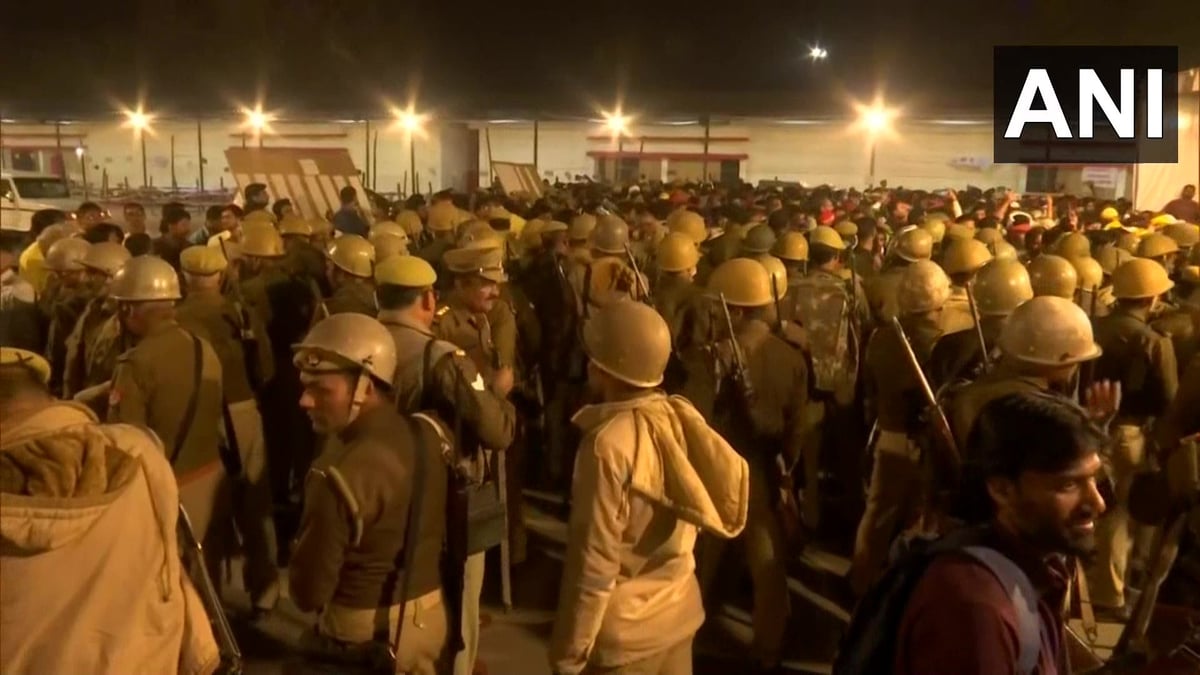


Workers of the Samajwadi Party have been working round the clock to protect the electronic voting machines (EVMs) stored in strong rooms in different districts, even as exit polls predict a Bharatiya Janata Party (BJP) victory. In every Assembly segment, ten party workers are working in three shifts to keep a close eye on the EVMs. They are also providing training to the counting agents to spot any attempt of sabotage on the day of counting.
Electronic Voting Machines (EVMs): A Deeper Dive
Electronic Voting Machines (EVMs) have been a contentious issue in Indian elections since their introduction in the early 2000s, with allegations of tampering and concerns about their reliability.
Background
EVMs were first used in India in the 1982 Kerala by-elections. The Election Commission of India (ECI) gradually expanded their use, and by the 2009 Lok Sabha (Lower House of Parliament) elections, EVMs were used in all polling stations.
EVMs work by recording the voter's choice electronically on a chip. The chip is then sealed inside the machine until the end of the voting process, when the votes are tallied and the results are displayed.
Allegations of Tampering
Despite the ECI's claims that EVMs are tamper-proof, there have been numerous allegations of tampering over the years. In particular, the 2019 Lok Sabha elections saw widespread protests from opposition parties alleging that the EVMs had been tampered with to favor the ruling Bharatiya Janata Party (BJP).
The ECI has consistently denied these allegations and has maintained that EVMs are secure and reliable. However, in 2019, the Supreme Court ordered the ECI to review the security of EVMs and implement additional safeguards.
Current Situation
In the recent 2022 Uttar Pradesh Assembly elections, Samajwadi Party workers have been deployed to protect the EVMs stored in strong rooms. This move is a response to exit polls predicting a BJP victory, raising concerns about potential attempts to manipulate the results.
Top 5 FAQs and Answers
Are EVMs reliable? According to the ECI, EVMs are highly secure and reliable. However, there have been allegations of tampering, and the Supreme Court has ordered a review of their security.
Can EVMs be tampered with? The ECI claims that EVMs are tamper-proof, but various experts have doubted these claims. In 2019, the Supreme Court ordered the ECI to investigate allegations of tampering.
Why are political parties skeptical about EVMs? Some political parties believe that EVMs can be manipulated to favor certain candidates or parties. They have called for a return to paper ballots or for the introduction of verifiable paper audit trails (VPATs), which would allow voters to verify their selections.
What measures has the ECI taken to address concerns about EVMs? The ECI has introduced several measures to enhance the security of EVMs, including the use of Voter Verifiable Paper Audit Trail (VVPAT) machines, which provide a physical record of votes cast.
What is the future of EVMs in India? The future of EVMs in India is uncertain. Some experts believe that they will continue to be used despite concerns about their reliability, while others believe that they will eventually be replaced by more advanced and secure voting systems.

Nvidia, the Silicon Valley titan, has broken yet another market record by becoming the first company to reach a staggering $5 trillion valuation. The remarkable achievement highlights the profound impact of the company's AI chips in driving the ongoing AI revolution. However, concerns have been raised about inflated tech valuations, with the IMF warning of a possible "AI bubble." As Nvidia continues to expand globally and diversify its offerings, it remains to be seen if it can sustain its unprecedented growth.

The Federal Reserve announced a quarter point rate cut, bringing the benchmark interest rate down to a range of 3.75% to 4%. While some economists predict another cut in December, Federal Reserve Chair Jerome Powell stated that a third consecutive reduction is not guaranteed. The decision was made amid the ongoing government shutdown, causing policymakers to rely on private sector indicators for their decision. This move signals the Fed's greater concern about a cooling job market than lingering inflation. With 10 out of 12 members voting in favor of the action, the outcome of the meeting showcased deep division.

Father Muller Charitable Institutions, led by director Fr Faustine Lucas Lobo, has taken a big step towards progress and excellence by inaugurating and blessing four modern classrooms for the students of Father Muller College of Physiotherapy and Father Muller College of Allied Health Sciences. The ceremony, attended by management committee members, faculty, and staff, also saw the presence of respected individuals like Dr Michael Santhumayor and Fr George Jeevan Sequeira. These new additions are a testament to FMCI's commitment to providing top-quality education to its students.

The US Federal Reserve made the decision to reduce its key interest rates for the second time in a row, bringing it down to 3.75%-4.00%. The rate cut was approved by a 10-2 majority vote, with two dissenters who wanted a steeper cut or no cut at all. The Fed also announced that it will stop the reduction of its asset holdings from December 1, but did not provide any indication of its plans for the next meeting in December.

Traditional performance reviews often lack the necessary information and structure to be truly helpful. Lark Base, a project management tool, aims to change this by centralizing performance data into one source of truth. This not only allows for more accurate and comprehensive reviews, but also enables managers to track and improve client-facing projects and employee milestones. Additionally, Lark Messenger promotes a culture of constant feedback by making communication structured, easy to find, and tied to actionable items. With Lark Base and Messenger, performance reviews become more meaningful and effective for both employees and managers.

In a significant development for India's aviation industry, Hindustan Aeronautics Limited (HAL) has signed an MoU with Russia's PJSC-UAC to manufacture the SJ-100 aircraft domestically. This marks the country's first full passenger aircraft production in over three decades and is seen as a major step towards achieving self-reliance in the civil aviation sector. With an expected demand for over 200 jets in the coming years, this partnership is crucial for strengthening regional connectivity and boosting the domestic manufacturing economy.

The Union Cabinet has approved the Terms of Reference for the 8th Central Pay Commission, which will revise salaries and benefits for central government employees and pensioners. The commission is expected to submit its recommendations in 18 months, following extensive consultations with various stakeholders. The recommendations are expected to be implemented from January 1, 2026.

Swan Defence and Heavy Industries, in collaboration with MDL, is making significant investments and expanding capacities at India's largest shipyard in Pipavav Port. This strategic partnership not only reinforces #AatmanirbharBharat but also opens up opportunities for partnerships and tie-ups in the shipbuilding space. The recent signing of a MoU with Mazagon Dock Shipbuilders to design and construct Landing Platform Docks for the Indian Navy is a testimony to this.

Aviation Daily reports that Air China Cargo, a subsidiary of Air China, will soon be acquiring up to ten Airbus A350Fs as part of its efforts to expand its fleet and improve air transport services. The announcement was made by Chen Chuanren, a renowned aviation correspondent for the Aviation Week Network, who joined the team in 2017. This move by Air China Cargo highlights the growing demand for air transport services in the Asia-Pacific region and is expected to contribute to the company's continued growth and success.

Airbus has officially inaugurated its new final assembly line for the A320-family in Tianjin, marking its 10th production line globally. The line is expected to significantly increase production and help achieve Airbus' target of 75 A320-family jets per month by 2027. The advanced facility will feature the company's latest technologies and processes to ensure high-quality production of aircraft worldwide. Plans for the second line were initially announced in 2023 during a state visit by French prime minister Emmanuel Macron.